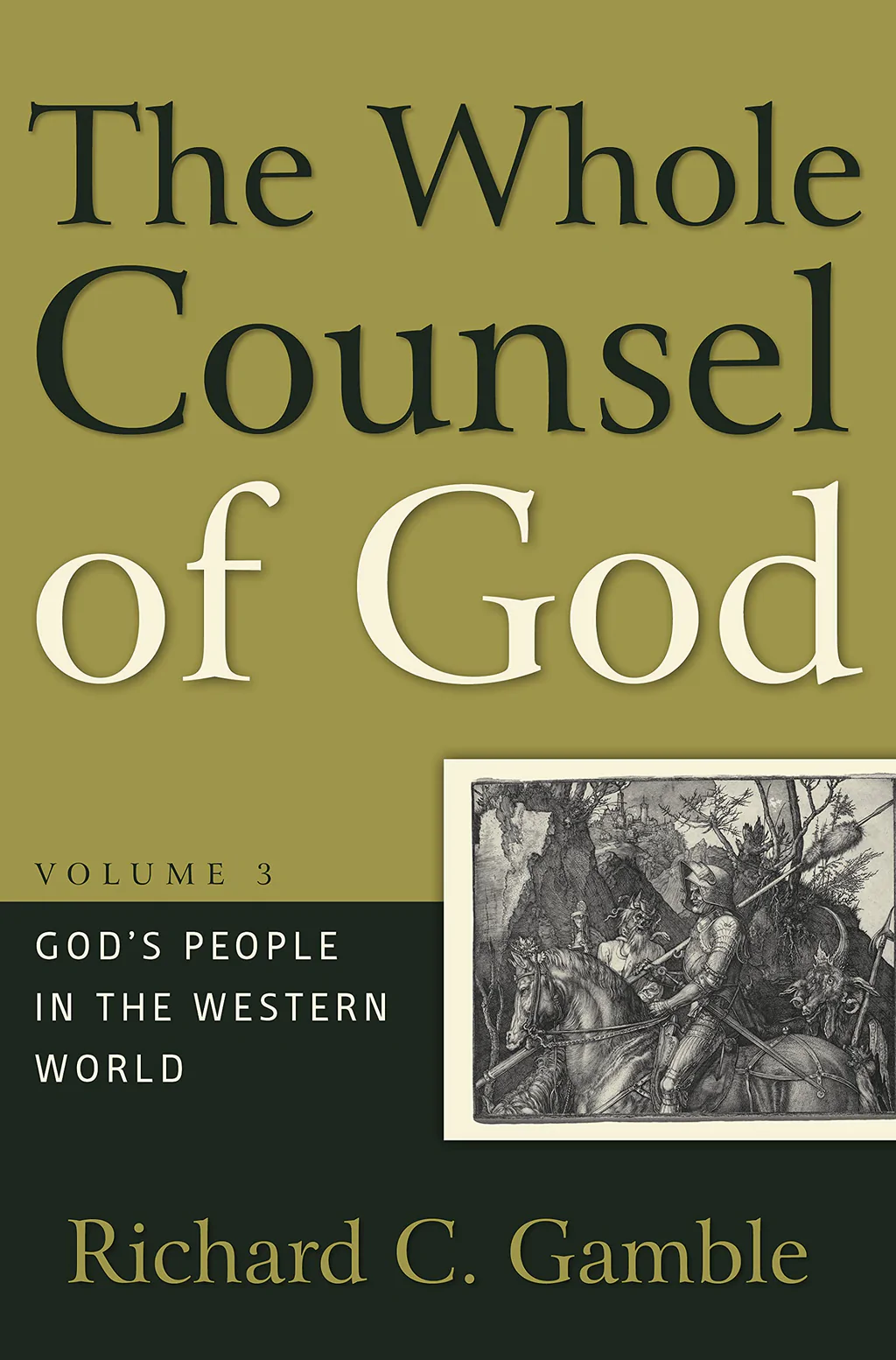
Richard C. Gamble
Reviewed by: Brian E. Belh
The Whole Counsel of God, vol. 3: God’s People in the Western World, by Richard C. Gamble. P&R, 2021. Hardcover, 1216 pages, $35.99. Reviewed by OP pastor Brian E. Belh.
Richard C. Gamble, in his enormous tome, God’s People in the Western World (vol. 3, The Whole Counsel of God) gives a sweeping and, dare I say, breathtaking overview of the history of Western philosophy, theology, and the church, from the pre-Socratic Greek philosophers, to contemporary discussions and debates among our very own Orthodox Presbyterian theologians, and nearly all points in between. It is important to note that this study has as its focus the Western church and its development. Gamble is clear on this point. He has intentionally limited the scope of this project to the Western tradition, and so if one is interested in historical, theological, and ecclesiastical developments in other parts of the world, this volume will be of limited value to that sort of research. However, if you are interested in the development of the Western church in history, as it grew from the Apostolic Fathers to our own day, this volume will be profoundly helpful.
This work divides into seven parts: The Church under the Cross, The Church Defines Herself, The Church and the World, Post Tenebras Lux, The Church after the Reformation, The Church in the Modern Western World, and The Postmodern World. Each of the seven parts begins with a chapter that describes the philosophy of the time. Thus, the first chapter of this book discusses, briefly, the major figures of Greek philosophy who influenced the thought of the world at the time when the Apostolic Fathers and the earliest apologists were writing. This is helpful, because it aids us in making sense of the thought-world that then existed and in understanding why the debates in theological development proceeded as they did. Gamble’s work in each of the sections really is a masterful blending of historical philosophy and theology in a way that enables the reader to understand each period in the development of the church in its understanding of the Word of God.
But Gamble’s concern isn’t merely to give us a sweeping overview of the development of the church in history. His volume has an apologetic drive as well. In chapter 26, entitled “God’s People Respond to God’s Mighty Acts: Answering Questions,” he identifies questions that Christians need to be ready to answer and advises on how to answer them. In terms of apologetics, Gamble has clear sympathies for Van Til’s presuppositional approach. He also relies heavily on the work of John Frame for his chapters on philosophy and his discussions on Van Til’s method. Those who appreciate the biblical theology of Geerhardus Vos will find a kindred spirit with Gamble, who expressly states that this entire three-volume project is inspired by Vos’s approach (910). Gamble also aligns himself with the concerns of the Alliance of Confessing Evangelicals and is clear that he believes that the broader Evangelical world needs Reformed Theology to keep its theological bearings (834–840).
This volume gives a lot of attention to our little corner of the Reformed and Presbyterian world. It was illumining to read about current debates between Westminster Seminary California and Westminster Theological Seminary in Philadelphia. I warmly recommend this volume to officers of the OPC, men under care, seminary and college students, and those members who like to wade into deeper historical, philosophical, and theological waters.
September 07, 2025
August 31, 2025
J. N. Darby and the Roots of Dispensationalism
August 24, 2025
August 17, 2025
Reformed Covenant Theology: A Systematic Introduction
August 10, 2025
August 03, 2025
July 27, 2025
© 2025 The Orthodox Presbyterian Church